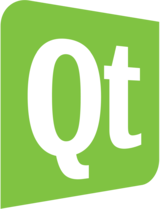Qt: Difference between revisions
Appearance
No edit summary |
m Version bump |
||
| Line 12: | Line 12: | ||
==Versions== | ==Versions== | ||
* Nov 2005: 3.3.1-rc06 | * Nov 2005: 3.3.1-rc06 | ||
* '''Latest Version for OS/2-eCS''': Qt 4 version 4.7.3- | * '''Latest Version for OS/2-eCS''': Qt 4 version 4.7.3-2 (2013-03-23) | ||
==Links== | ==Links== | ||
Revision as of 04:43, 2 July 2016

Qt is a cross-platform C++ application and UI framework that abstracts the user interface and presentation from the operating system, allowing you in theory to write applications once and deploy them across many desktop and embedded operating systems without rewriting the source code. (See http://en.wikipedia.org/wiki/Qt_(toolkit).) Availability for eCS means being able to port a large number of existing applications.
- Commercial version
The company behind Qt offers a commercial version of Qt that offers both extended C++ classes, more extensive framework and full technical support, however since the OS/2 version is an independent port the company does not support the software on that platform.
- Qt development tools
- PyQt - Python bindings for Qt
- Qt Creator
- Qt Designer
Versions
- Nov 2005: 3.3.1-rc06
- Latest Version for OS/2-eCS: Qt 4 version 4.7.3-2 (2013-03-23)
Links
- Netlabs SVN: http://svn.netlabs.org/qt4
Licences
- GNU GPL[3] 3, with Qt special exception
- GNU Lesser General Public License (LGPL v2.1) (Qt open-source version)
- Qt Commercial License (Qt Commercial version)
Publishers
- Troll Tech
- Digia